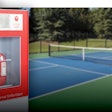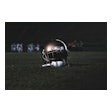Copyright 2016 Gannett Company, Inc.
All Rights Reserved
USA TODAY
High school football, as it closes the book on another season, faces existential questions. More than 1 million players perform each year under Friday night lights -- and, increasingly, under the scrutiny of physicians and anxious parents.
This week, the governing body for public high school sports in Texas partnered with the UT Southwestern Medical Center to launch the nation's largest study of sports-related concussions. This month, the medical journal Pediatrics featured a pediatrician who said high schools should discontinue football and another expert who said there wasn't enough evidence for that.
By now arguments such as these have a familiar ring -- a blur of heads-up tackling and the insidious danger of repeated hits to the head.
All this is acutely personal for some families. USA TODAY Sports spoke with the parents of five former high school players. These mothers and fathers don't have doctorates or medical degrees, but they are indisputably experts in what can go terribly wrong in the secondary school version of the country's most popular sport.
Brandon Steburg Sr. is the father of Brandon Jr., who was injured on a tackle for Papillion-La Vista High School in Nebraska in September. Brandon Jr. was placed in a medically induced coma to reduce pressure on his brain.
Katrina Henderson orchestrated a homemade homecoming dance at the rehab facility of her son, Bruce, this fall on the night of the real one at Sultana High School in Hesperia, Calif. He had been hurt when he struck his head on the ground making a tackle in September. Doctors removed a portion of his skull to relieve pressure.
Dave and Cortney Maronic are the parents of Toran, who was knocked unconscious during a no-contact, 7-on-7 passing drill when he collided with spectators on an adjacent field last spring. Toran played for Bear River High School in Grass Valley, Calif.
Frank Cutinella's son, Tom, died after a helmet-to-helmet hit in a game for Shoreham-Wading River High School on Long Island, N.Y., in 2014. Today Frank advocates for safety in the sport.
Jodi Williams is the mother of Drew, who needs 24-hour care after he collapsed in 2013 while playing for Lane Technical College Prep High in Chicago. He remains minimally responsive, his mother said in September.
Here these parents tell their sons' stories in their own words, lightly edited for clarity and context.
What happened on the field?
Frank Cutinella: "He suffered a traumatic brain injury during that game from a helmet-to-helmet hit and essentially died on the field. We'll leave it at that. ... It was an illegal hit, of course not something that anyone I'm sure wanted or thought was going to happen. It does me no good to blame the other player, the coach or anything like that."
Katrina Henderson: "I saw him kind of limp off the field and thought he rolled his ankle or something common. I walked down the stairs in the stands toward the field and saw he was leaning across the trainers table. He had started to cry. He doesn't show any pain during games, so I knew more was happening. They moved him from the table, and he was leaning against the back of a golf cart. At that point, I saw it in his eyes. I jumped over the fence. He had a squeeze bottle with water. That's when he started his seizures. I counted six while I was standing there. The paramedics got there and he had more."
Jodi Williams: "Without getting into legal trouble, because we do have an open legal case, I would say there were multiple hits that Drew sustained that game on offense and defense."
Dave Maronic: "We were at a 7-on-7 camp, (and) he went out for a corner route, and the fields were only 6 yards apart from each other. Two parents from another team were right next to our pylon, and when Toran dove for the ball, he flew into the back of these gentlemen, which knocked him unconscious, and he flew into the ground and blacked out, so he didn't protect himself at all. The first thought from across the field was that there was an arm or leg issue. We took off across the field, and when we got there he was in full convulsions and bleeding from the mouth."
Brandon Steburg Sr.: "He hit the quarterback, and then he got up, and he was tapping his head to the sidelines. And I honestly thought he was just signaling for I didn't know what. But he seemed fine, but out on the field he was telling his teammates something was wrong. He couldn't think. He thought he had a concussion. He got down for the next play and whoever was defending him must have known something was wrong because they didn't touch each other. Then he ran off the field, and I thought maybe he wasn't feeling good because they brought a trash can over. He threw up, and then it seemed like a little desperation, and the trainer looked up at me and waved me down. By the time I got there, he was already unconscious. He had a look of terrible pain on his face, and we couldn't rouse him."
How is your son today?
Williams: "He is minimally responsive at this point. He has a trach tube, so he needs suctioning numerous times during the day because he does not swallow. He doesn't speak, and he really doesn't move other than he can squeeze your hand. He can move his head left and right and will blink. His communication is through those modes. He remains in physical therapy to get him up and standing. He's inconsistent with his gaze, so we're trying to find out how much vision he has. He needs medication and diaper changes and changing his positions. He needs 24-hour care, most of all for the suctioning."
Henderson: "He had the bone put back in his skull Nov.16, and he's doing much better. He still has memory loss -- sometimes long term and sometimes short term. He could do something today and remember it perfectly tomorrow. It comes and goes. His schoolwork is still hard, and he gets frustrated when he doesn't grasp things quickly. He's doing homeschooling now, and he'll go back to school when they go back from Christmas break. The physical part is there. His right side is not as strong as his left, and he does have a little bit of vision loss on the right side."
Steburg: "There's a lot of things he can't do, nothing that has contact to it. But other than that, I don't think there's any restrictions because of how well he's healed. I know his neurosurgeon told us that in his whole career he's never seen anybody heal like that."
Cortney Maronic: "Toran is recovering beautifully. He has been discharged of all of his rehabs at this point. He was able to get his driver's license back last week after being seizure-free and having an EEG. He is working on his speed and agility, hoping to gain the rest of the 25 pounds back he lost in the hospital and be ready if and when he can play sports again. Nothing for at least a year."
Would you let another son play football?
Cutinella, whose son, Kevin, continued to play: "It's extremely difficult. Hindsight is 20/20, but unfortunately he had been playing football since he's 6, and as a young man and as a young adult, I supported his decision, my wife and I supported his decision to continue to play. But it's very, very difficult to watch anything about football, having watched my son die essentially at my feet in the middle of the field. We support him, and we care about all football players and that's kind of why we're (speaking out). I don't think the NFL cares about all football players, and that makes me sad to say that, but I believe it's true."
Williams, whose son Bryce continued to play: "Of course it makes you think twice about it. But it's hard for me to answer that. I am still allowing one of my sons to play football. I think it's going to be different, in terms of the medical personnel. When Drew played, they had contact all through summer. There was a lot of contact. I'm glad (now) they have adopted that program (of limited contact), which was more comforting to know."
Dave Maronic, whose son, Tredan, continued to play: "He just went into ninth grade, and he was the starting QB of the JV squad right out of the gate. And I didn't hesitate. I sat with him one day on the trip from the hospital to the hotel, and we had the conversation and told him we would be happy, no matter what he wanted to do, and he said there was no question he was going to play. I just feel that you can't put your life in bubbles. This was not a football injury for us. It did happen in a football game, but it can happen walking out your door, slipping and hitting your head on concrete."
Steburg, whose son, Mike, continued to play: "My youngest is 13. He plays. This was a progression. We said in the waiting room while Brandon was having surgery that none of our children are ever playing football again. And my 13-year-old was the same. He was extremely upset. He never wanted to play again. ... I hated the sport, hated it with a passion, but that changed because Brandon still loves it, loves football. And he said that he'd be upset if Mikey didn't want to play anymore. He said, 'That's how I'm going to get my football now is watching him play.' So we love football still. It's more dangerous to let your kids take your car keys than it is to let him play a sport. So we decided in the end if he wanted to play, he could play. He wants to play."
Henderson: "If my younger son wanted to play, I would let him. I honestly think it was a freak accident."
What do you want others to know?
Dave Maronic: "I hate the concussion word. I hate it. Everyone is so loose by saying that he suffered a slight concussion. There's no such thing. If it's a concussion, it's an injury to the head, which is the most important part of your kid's opportunity in life."
Williams: "Sometimes you don't want to read too much, because it makes you think too deeply. The best way I can explain it is to get by day by day. You can't think about: 'What would Drew be doing right now. Would he be in college? Would he be this or be that?' That will tear you apart. I know enough to get by. You just do and take care of him."
Cutinella: "I think there's a problem in football, and I think the culture of football must change. I think it has a lot of benefits. That's why I can't tell you people shouldn't play football because my son adored football and it wouldn't be fair to him for me to do that. But there needs to be changes, and I think what we've accomplished with the leaders of SectionXI (one of the geographic sections of the state's public high school athletic association) we're getting our message out there that risk can be minimized. And, hey, in order to fix something, you have to have leadership and you have to identify the problems. I think at the higher levels, in the NFL, they don't care about high school kids, and I don't think they care about my son's death."
How would you change the game?
Dave Maronic: "They don't have to hit at practices. All those impacts are a traumatic hit to the head, and in young boys -- when our brains aren't developed until 21 or 22 -- the second impact is so traumatic. If your son suffers a concussion, even if it's (so-called) minor, just let him sit out at least a month and let it heal. You're putting kids at risk for terrible, terrible injuries. I'm all about aggressive play on Friday nights, but we don't need that during the week. ... Would you advise people to go out and have a car accident Monday, Tuesday and Wednesday to prepare for a really huge car accident Friday night?"
Cutinella: "We've all been programmed after seeing the big hit so many times that that's just accepted or it's just part of the game. Well, it's never meant to be part of the game. Let's say, for instance, another player is running and he is out of your vision and may be at a side angle, and let's say he gets leveled. That's not a good hit. It's not a clean hit. It's not a great hit. However, we've been so programed through the 'ooh and ah' factor that people think that it is. I think through leadership, through accountability, through education, through rule changes and through enforcement, we can change that behavior. These are high school kids here. We're not looking to punish them. We're looking to change a behavior, and it's very realistic."
Steburg: "I don't know. I look at the helmets now vs. when I played, and they are a million times better than they were. ... From what it seems like to me, the progression as the years go by is it is getting better. They are trying. They're making an effort."
What advice can you offer other parents who might someday face challenges like yours?
Steburg: "It's such a chaotic thing that it's hard to give advice. It really is. Because I went into it, and now I think back on it like a dream, almost. A lot of prayer and a lot of support from family and friends got us through it. As far as advice goes, I would only pray that they have a lot of friends and family around them to help them, because that's what got me through it."
Williams: "Just make sure the athletic trainers are there. I think there should be medical people on all teams even at the high school level. Make sure the equipment is new and the school is buying the latest model of helmets. Make sure the parents and players know what concussions are and what to look for. Talk to your child to make sure he understands. The whole team should be aware of the signs."
Henderson: "I would say, a lot of prayer and a lot of patience. Don't try to rush anything, and follow the limits given by the doctors and therapists. If they say there is only this much they can do, don't go any further."
Cutinella: "Every time my wife and I read about another story about someone in a coma or who has died playing football, it takes time for us to even recover from that. We hurt for those families so much. What I would say is if their child had a song to sing, they need to continue to sing it. That's what my wife and I are doing. We don't want to tell people play football or don't play football. But for people who are playing -- and again, I have another son who is playing football -- we believe we can minimize the risks through leadership, No.1, and again, through accountability, education, rule changes and strict enforcement. Our heart does break for those families, and I dread hearing about them. But they continue to happen throughout the country."
Read More of Today's AB Headlines
Subscribe to Our Daily E-Newsletter
Terms and Conditions Privacy Policy































